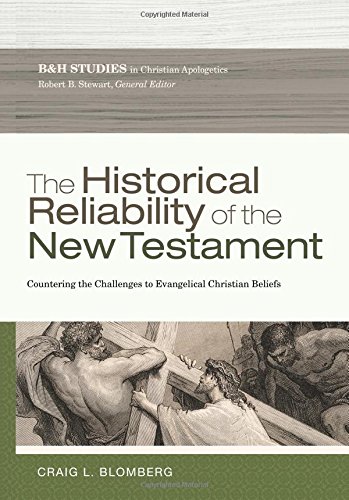One of the unique traits of Christianity is the significance of its historical claims. Everything rises and falls on the genuine historicity of the events recorded for us in the New Testament and on the genuineness of these foundational documents. And it’s a wonderful service to the church when someone rises to challenge those who challenge Christianity on this score.
Hi, I’m Fred Zaspel, executive editor here at Books At a Glance, and that’s what Craig Blomberg has done for us in his new book, The Historical Reliability of the New Testament: Countering the Challenges to Evangelical Christian Beliefs. It’s a thorough and impressive work, and we’re very happy to talk to him today about it.
Dr. Blomberg, welcome – and congratulations on your new book!
Blomberg:
Thank you for having me on your program.
Zaspel:
Give us a little of your history here – this book is not your first on the subject, is it.
Blomberg:
It’s not. I became a Christian at age 15 through Campus Life Youth for Christ Club in high school and then was nurtured, particularly in college years, through Campus Crusade for Christ and probably encountered most of the classic challenges to Christianity as I tried to share my faith during those years in school. I quickly became aware that the old “trilemma” as Josh McDowell summarizes CS Lewis’s logic, was missing a category. There weren’t hardly any people who were calling Jesus a liar or a lunatic but if they didn’t call him Lord, it’s because they believed he was a legend. I realized that all the great Bible verses and quotations of what Jesus said did me no good when the reply I got from somebody was, “well, but of course modern scholars know that Jesus never said that, or Jesus never did that.” So my interest was piqued very early on.
Zaspel:
Interesting. And you’ve done other works on the subject?
Blomberg:
The very first book I had the chance to publish was called, The Historic Reliability of the Gospels, and the second edition, 20th year anniversary edition, came out in 2007 of that. I later had the opportunity to do a more specialized work just on John’s Gospel in 2001. Both of those were with Intervarsity Press. Friends challenged me from time to time to go further and consider all of the New Testament, which is what I’ve tried to do in this recent work.
Zaspel:
What is new about this book? And what is the contribution you are hoping to make?
Blomberg:
It’s certainly true that Jesus is the center, or should be the center of Christian faith and so a lot of the issues do emerge in the Gospels. But there are plenty of questions about the trustworthiness of the Acts of the apostles; there are questions about how to fit it together with the information that we learn, especially the autobiographical information about Paul in his letters; there are all kinds of questions about whether Paul and the other persons to whom New Testament letters are assigned were the actual writers of those letters; and then there are questions that surround the periphery of the New Testament, such as, “did the church choose the right books?” Ever since Dan Brown, about 13 or 14 years ago, popularized his blockbuster da Vinci Code novel, people have taken a lot of what he wrote as fiction as if it were fact and imagine that there were dozens of other ancient texts competing from the earliest days on with the 27 New Testament documents. Which simply isn’t the case.
Zaspel:
Can you give us a brief overview of the book? And maybe give us a couple samples?
Blomberg:
It proceeds through the New Testament in the order in which we have it. So it deals with questions arising out of the Gospels first and then moves to Acts, and then to the epistles. It even has a chapter on the book of Revelation, which, probably, I wouldn’t have had to include but because so much in the book of Revelation makes sense once you understand what people in the churches that John wrote to at the end of the first century understood about the Roman world in which they lived, that’s a historical question as well. At the end, I tried to group together a number of topics that don’t relate just to one part of the New Testament, but impinge on all of it. Such as the question of the canon, the selection of the books. Such as, how well where the documents transmitted, passed along. Questions about ancient Gnosticism from which a lot of the books sometimes proposed in today’s world as alternatives to the New Testament books come from. And then I ended with a chapter on miracles because, although that’s a very different kind of question, it certainly is relevant for those who say, “I can believe everything, but I can’t believe that Jesus turned water into wine,” or things like that.
Zaspel:
It’s not terribly uncommon to hear someone inquire how we can be sure that the 27 books of our New Testament in fact properly belong to the canon. Can you sketch out an answer for us?
Blomberg:
Well, the first thing I would say is that anytime you’re talking about history and you start to question how can we be sure, or how can we have proof, or can I know with absolute certainty, the answer has to be no. There’s always room for faith and we have to live by faith and not by sight, but we can surely give very suggestive answers. There really are no books that have been preserved that we can, with any confidence, date to the first century, other than emerging out of early Christian circles, other than the 27 from the New Testament. There are one or two that may have been written right at the tail end of the century or very early second century, but that’s probably a starting place. These are the foundational texts. These are the ones that, during the lifetimes of at least some of the younger people who heard Jesus in Israel in the first third of the first century were still alive. So you look to sources that go back to the earliest period to get your foundation. The church also, as it did consider these questions, asked about whether books could be linked to an apostle or a close associate of an apostle. They ask questions about the continuity of thought. Did the same kind of theological conclusions overall emerge? If you read the Gnostic works, there’s hardly any use of the Old Testament and what little references to Judaism appear, border on being Anti-Semitic. So you’re in a very different Greek philosophical world that doesn’t seem to be the world of the earliest generations of Christianity. Then you also want to look for widespread use. It’s certainly true that sects grew up here and there with some special works that they valued. But if a document was never widely known, much less widely used throughout the early church, then they were very reluctant to include it. Those would be some of the key criteria we would need to start with.
Zaspel:
And are textual questions of any real consequence? Can we be sure that the copies we possess are faithful to the originals?
Blomberg:
We can be extremely confident that the editions of the Hebrew and the Greek Testaments that modern scholars have reconstructed are extremely faithful to the originals. There are rarely any two copies of any significant stretch of biblical text that match each other exactly. Even if the differences are only that certain words are spelled differently. And sometimes, in fact often, there will be very minor differences – the presence or absence of an article like a ‘the’ or an ‘and,’ a conjunction, word order where it doesn’t really affect the meaning of the text. And then as modern readers of English translations can know if they simply look at their footnotes, there are a handful of places (I say ‘handful’ in comparison to the total number of documents available) where there are some interesting differences. But we have the ability, because we have so many documents (probably over 5800 in the Greek New Testament alone) that enable us to, with good confidence, reconstruct what was probably originally written.
Zaspel:
Just broadly, how should a Christian approach the question of miracles in the New Testament.
Blomberg:
With an open mind (laughing). Anybody ought to approach the question with an open mind. If somebody has genuinely become a Christian, then in some ways they have an easier task because by definition that means they’ve come to believe that there is a God who exists, who can’t be proven by some geometric theorem, but for which there are good reasons to believe he exists and that that God uniquely revealed himself in the person of Jesus of Nazareth in the early first century in Israel and through the apostles and other associates of the apostles that wrote the rest of the New Testament. So if you’ve got that as a starting point, then, if you’re consistent, you’re already open to the question of miracle. That doesn’t mean that we become gullible and accept any account of miracle in an ancient work. Because there are plenty in books outside of the Bible that don’t have a lot of evidence to support them. And there are plenty that appear in books that have a very different literary genre, that disclosed themselves to be fictitious to begin with. But one of the striking things that sets the New Testament miracles off from most others, including later centuries’ Christian miracles, is that they are tied to the arrival of the kingdom of God. However strange one or two may seem to us at first glance, they all in some way point to the fact that the long-promised reign of God through many Old Testament prophecies, through the coming of his Messiah liberator for his people, is now taking place in the life and teachings of Jesus. Sometimes the connection is made explicitly in the text, and in many other cases it’s more implicit, but Jesus did nothing, and the New Testament followers of Jesus who have miracles recorded, did nothing that was self-serving. It was always for the benefit of others and it was always in the context of something that was religiously significant. Namely, that a new stage in God’s work with human history had come.
Zaspel:
We’re talking to Craig Blomberg, Distinguished Professor of New Testament at Denver Seminary, about his new book – his magnum opus – The Historical Reliability of the New Testament: Countering the Challenges to Evangelical Christian Beliefs. It is an outstanding resource that you will not want to be without.
Craig, thanks much for talking to us today.
Blomberg:
You are very welcome.
Buy the books

The Historical Reliability of the New Testament: Countering the Challenges to Evangelical Christian Beliefs
